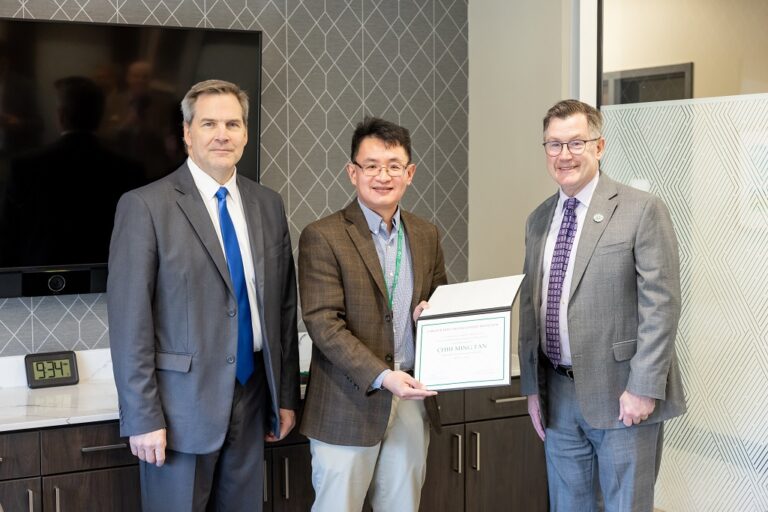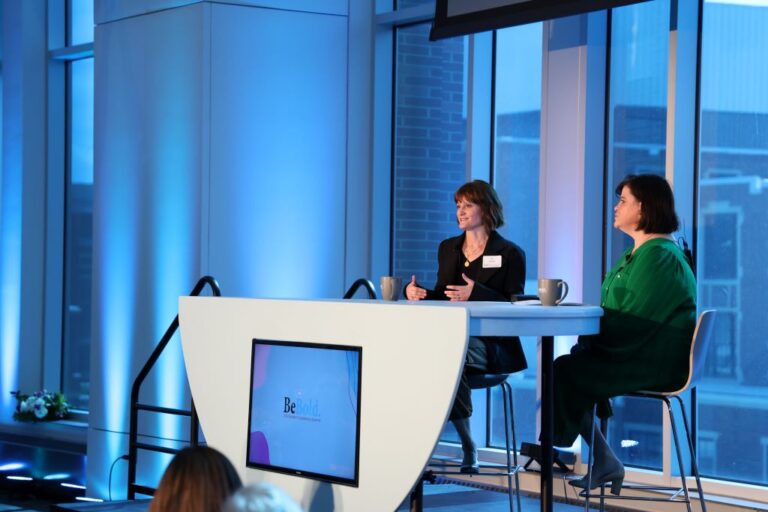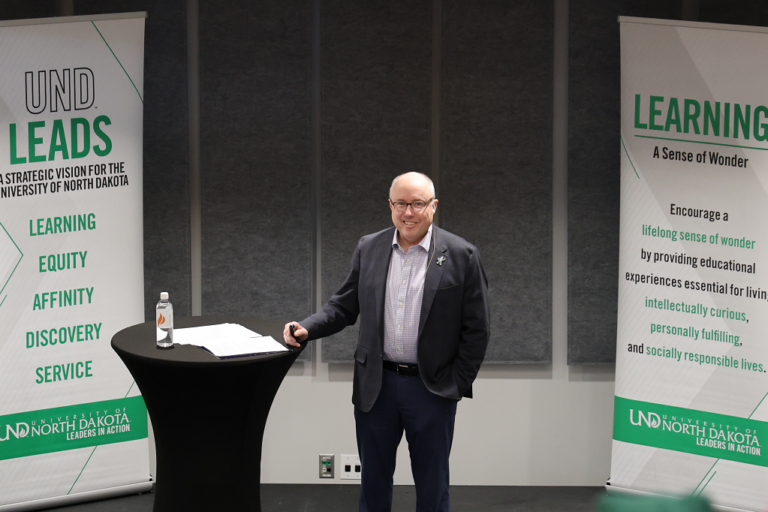UND.GRO learning garden takes root on campus
Educators plant seed for lifelong environmental stewardship, sustainability and responsibility

Joshua and Cheryl Hunter have been planting far more than tomatoes, strawberries and sunflowers in their greenhouse classroom inside UND’s College of Education & Human Development.
This spring, the associate professors in the graduate program for Educational Foundations & Research are sowing the seeds of community, environmental stewardship, responsibility and sustainability with the launch of their GRO.UND learning garden. (The GRO part is pronounced “grow” and is a play on words, not an acronym.)

“Gardening and being outside surrounded by nature always has been a shared passion for us,” said Cheryl Hunter, a former elementary teacher. She and her husband have done extensive research in experiential and embodied learning — the latter described as an educational approach that focuses on the body and feelings as opposed to concepts that are more academic in nature.
If that sounds a bit convoluted, it might be easier to think of it as learning to ride a bike vs. learning your multiplication tables. Both are valuable lifelong skills, but you master them in very different ways.
That said, one of the biggest benefits of a learning garden is that it has no particular educational division lines, Joshua Hunter added.

“There’s a whole world of life and learning right out our back door,” he said. “If you think about it, learning gardens let you explore almost any subject — literature, art, social studies, math, science — it doesn’t really matter.
“The awesome thing about learning gardens is they have no boundaries. They can cross all academic disciplines.”
That’s likely the same reason they’ve become so popular at K-12 schools in recent years. Not only are they uniquely suited to give real-life meaning to students, but they also offer current and future teachers almost infinite methods to demystify difficult concepts.

Hands-on and in the dirt
Joshua Hunter is the director of UND’s Outdoor Leadership and Environmental Education, a minor degree program that builds leadership through strong communication skills and a broad foundation of experiential education and field-based applications. The program’s goal is to foster physical, emotional and cognitive connections to the outdoors while also encouraging smart environmental conservation.

And a learning garden is a natural fit, especially for students seeking bachelor’s degrees in Education, Biology, Wildlife Biology, Environmental Studies or Atmospheric Sciences.
The Hunters noted that learning gardens are distinctly different from community gardens established for the primary purpose of producing food. With learning gardens, the produce is a bonus but just a byproduct.
The real bounty is the shared sense of place within a community. The garden provides a gathering space to connect and learn about others as well as the whole process of growing our own food from seed to compost.
“We want every student to feel connected to this place and to feel connected in a way that they want to protect it,” Cheryl Hunter said. “The community building, the caring and protecting come first. Everything else is kind of secondary.”
And that apparently wasn’t a hard sell when the Hunters sent out an invitation for people to attend an informational open house in February. At least 80 people showed up just for a chance to plant a sunflower and learn more about the project.

“Honestly, finding people who are engaged and interested in getting involved in this project is not hard. There’s a palpable desire for this type of program,” Joshua Hunter said. “That’s the easy part. More and more people have been talking, and it just keeps growing kind of organically.”
The college provided funding to give GRO.UND a jumpstart for the first three years, and the Hunters are creating three student fellowships to help manage the project and develop grants, programming and new partnerships to sustain it.
Facilities Management helped locate a spot for the garden kitty-corner from Archives Coffee House and behind the College of Nursing & Professional Disciplines.
“They were super supportive and did a tremendous amount of work helping us with tilling the soil, bringing in mulch, prepping everything,” Joshua Hunter said.

Setting roots, branching out
Since February, several partnerships have been forged throughout the Greater Grand Forks community — including with master gardeners and multiple organizations. Among them:
- The UND Student Wellness Center hosted a popular “De-stress in the Dirt” event for students and a “Digging in the Dirt” event for faculty and staff. And keeping stewardship top of mind, participants were asked to bring a donated food item for the Food for Thought Food Pantry. The garden eventually will provide fresh produce for the campus pantry, too.
- A local child literacy group co-hosted a story time with a GRO.UND plant sale inside Archives. Plus, the learning garden is sharing fresh basil for Archives to use in its baked goodies.
- Simultaneously, a student sustainability group has been working to establish a separate community garden, and that’s located nearby, behind the Archives parking lot.
In a short time, the number of campuswide volunteers has grown like zucchini under a hot July sun.

UND Today saw the process at work when we recently popped in on a group of enthusiastic gardeners recruited through a partnership with Head Start, a local early childhood education program. So far, about 80 children have planted individual sunflowers and taken part in different learning activities this spring.
The young gardeners — all 3 to 5 years old and aptly called Sprouts — may have been more green than green-thumb, but that’s not to say they didn’t know their way around a pile of dirt.
They’re newbies, sure, but they were learning and capable of making some rather astute observations.

Take, for instance, this assessment shared with adult volunteer Alicia Champagne, assistant professor and clinical education coordinator for the UND Department of Sports Medicine.
“They thought the dirt looked like cereal for the plants, which is not off. Pretty spot on if you ask me,” Champagne said. “It feeds the plants, so yeah, cereal.”

Or this from Angie Stokke, department assistant with the College of Education & Human Development: “The best quote ever was when we were first planting the seeds in the little peat pots, and one kiddo said ‘Oh, are we going to put this seed in that dirt muffin?’ That still brings me such giggles and joy.”
“I’m excited now to get outside in the dirt and the fresh air,” Stokke continued. “It’s a way to connect not only with yourself but with nature. And what a wonderful gift to give everyone from little kids to college students and on to adults, that little bit of peace in their day.”
Cheryl Hunter seconded that.
“At the heart of this project is the idea that we’ve got to come together in these experiences if we’re going to care about each other and love our community,” she said. “We believe a garden can make it all happen.”
>> IF YOU WANT TO LEARN MORE about the GRO.UND learning garden, go to learninggardens.org or email Cheryl Hunter at cheryl.hunter@UND.edu or Joshua Hunter at joshua.hunter@UND.edu. Follow the action on Instagram at gro_learninggardens.





